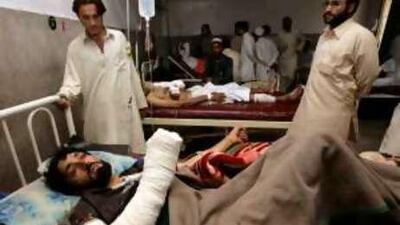ISLAMABAD // It has been hailed as Pakistan's version of the "Sunni Awakening" in Iraq, but Pakistani tribesmen who have taken up arms against the Taliban and al Qa'eda are themselves facing a bloody wake-up call.
A string of militant attacks, apparently aimed at scaring off pro-government tribal elders and politicians who have helped to drum up anti-extremist militias along the Afghan border, culminated in a suicide blast at a tribal gathering on Friday. A bomber detonated a car packed with explosives into a crowd of hundreds of people meeting in a field for a jirga (tribal meeting) in the remote north-western tribal district of Orakzai, killing 40 people and injuring scores.
A day earlier, Taliban militants kidnapped four elders after they attended a similar meeting in the Bajaur tribal region about 100 kilometres farther north. The attacks represent a serious threat to the fledgling movement of lashkars, or tribal armies, which are heavily backed by government money and facing a seemingly implacable enemy. Tribal elders say they are determined to drive militants out of the area in spite of the violence aimed at them.
"Our decision to launch a lashkar against the militants is final," said Din Azhar, an elder of the Alikhel tribe in Orakzai, which until recently has been one of the most peaceful of the tribal areas. "Before this attack, we found four tribesmen had links with the militants and we have now destroyed two of their centres. They can target our jirgas, but we are not scared of such activities." Another elder from Orakzai said the attacks would spur them on.
"At this time we are busy in burying the dead," said Gul Karim, the elder. "But after the burial and the mourning period we will call another jirga and then we will launch a fresh operation against the militants." In Iraq, US forces and the government in Baghdad have seen major gains since 2006 after persuading or, more often, bribing Sunni tribal leaders to fight against the al Qa'eda movement in the country.
Pakistan's new government, which successfully forced Pervez Musharraf to resign as president in August, has tried to emulate the Iraqi strategy in recent months with the inhabitants of the seven semiautonomous tribal areas bordering Afghanistan. Despite its reputation in the West as an anti-US hinterland that sheltered militants who fled Afghanistan after the fall of the Taliban in 2001, the tribal belt has seen growing discontent over the militants' tactics.
From the executions of more than 300 government-supporting elders by the Taliban, to the deaths of hundreds of civilians in suicide attacks and roadside blasts, the bloodshed has galvanised some of the tribes into taking up their Kalashnikvos. There is also anger over the hardliners' moral vigilante squads, reminiscent of the 1996-2001 Taliban regime in Afghanistan. Residents tell stories of women being dragged from cars at makeshift checkpoints if they are not wearing all-covering burqas, after which husbands have been forced to pay a "tax". In other cases women have been beaten, according to local media reports.
The first tribesmen to create their own militias were in Bajaur, where the Pakistani military launched a major operation in August to destroy what it described as a hub of al Qa'eda and Taliban militants. In the past week, new tribal forces have burnt down suspected militants' houses in the Khyber tribal region, which adjoins the north-western city of Peshawar, and in the relatively untroubled Mohmand tribal district.
The government has hailed their actions and also made public pledges that the attacks, like the suicide bombing in Orakzai, will not have any effect. "Such cowardly attacks cannot shake the government's determination. The nation is united against terrorism," said Rehman Malik, the acting interior minister, after Friday's suicide bombing. The extremists, however, have fought back in recent weeks, apparently in the belief that they can indeed shake the government.
This month, a suicide bomber came just metres away from killing Asfandyar Wali Khan, the chief of the Awami National Party, a secular group that replaced hardliners in government in North West Frontier Province in the February elections and has sworn to take on the Taliban. Given that the campaign is backed by the pro-US government of Asif Ali Zardari, the new president, there has been speculation about just how committed the tribesmen are.
In addition to their earlier hostility to Pakistani military operations in the border zone - troops entered the region for the first time in Pakistan's history in 2002 - the tribes of the area have a long history of shifting allegiances, especially where money is concerned. The elders themselves point to the fact that they have seen off opponents ranging from Alexander the Great to the British. Nevertheless, elders in Bajaur would only speak on condition of anonymity for fear of reprisals by the militants.
"Even though they have beheaded four of our colleagues and are targeting tribal elders, we will continue our struggle and we will never quit our operation against the militants," said a member of a jirga in troubled Bajaur. * The National

